Champion’s Mojo Podcast: Gary Taylor Trying to Lift Auburn to Past Heights
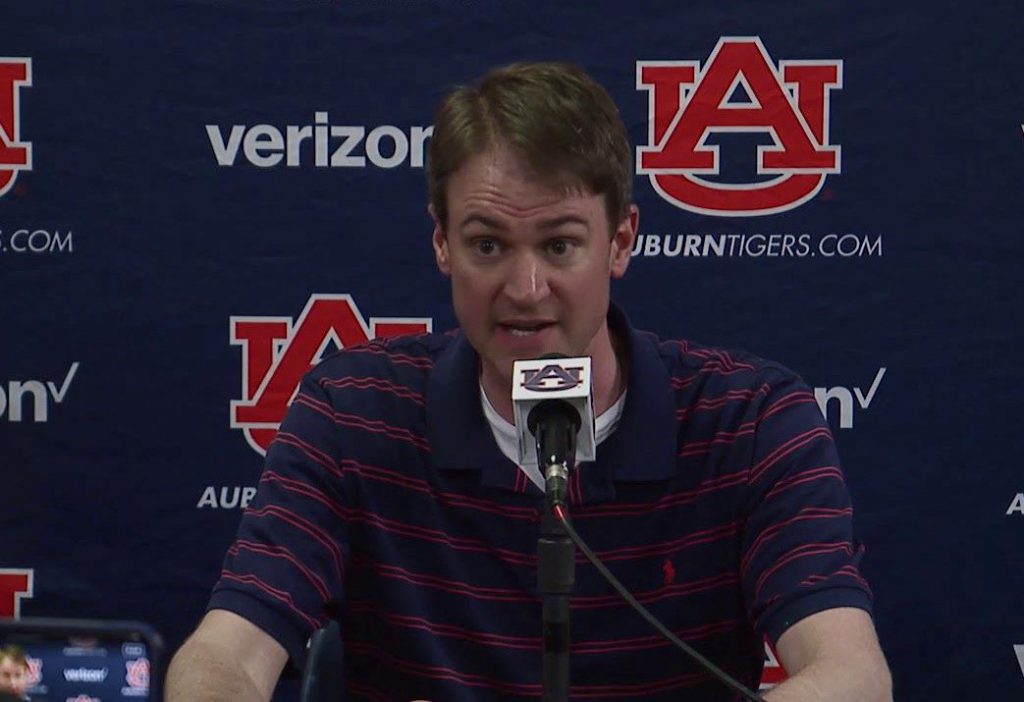
Champion’s Mojo Podcast (Gary Taylor)
Auburn men’s and women’s head coach Gary Taylor just finished his second year and is making strides to return this program to the top of the NCAA. Auburn has a storied history of swimming, having won 13 NCAA titles. With 10 successful years as an assistant at two powerhouse Division I teams, where he played a major role in their successes, Gary could have had his pick of head-coaching jobs, but was inspired to step up to lead Auburn. In this in-depth interview, Gary talks about championship character and how it leads to success.
Below is an abridged Q&A of the interview, conducted by Kelly Palace and Maria Parker, with Gary Taylor. Note: This show was recorded before the Covid-19 Pandemic. You can listen to the full podcast episode #56 at https://championsmojo.com or by clicking here.
Champion’s Mojo: Gary, now in your second year at Auburn, I’m sure you are establishing your own culture there. I’ve read about your idea that championship character creates championship culture. Could you expand on that for us?
Gary Taylor: I think that within our programs, we’re looking for outstanding students, outstanding athletes, people that get it done in the classroom as well as the pool. And I really think the final piece to that is championship character. Championship character to me is a number of different things that come together. You’re looking for people that have great work ethic, they’re great teammates, are incredibly selfless, who put the team and Auburn University ahead of themselves. We’re looking for people that are motivating to themselves and motivating to others. Beyond that, they’re also very goal oriented and aspiring to be there. They are 10 out of 10 or 11 out of 10 from a performance standpoint in and out of the water. And then finally, I think a championship character is someone that really, above all else, embodies a love and respect for all of their teammates. Not everybody in your program is going to be a best friend. But, ultimately, we can learn to respect and love everybody within the program. And I think that’s when teams really become close knit. They come together when you’re working hard to perform for the other people around you, even more so than yourself. I think that’s when you see outstanding swims and performances.
Champion’s Mojo: Where do you think culture comes from, the upperclassmen, the underclassmen, and from you, the staff?
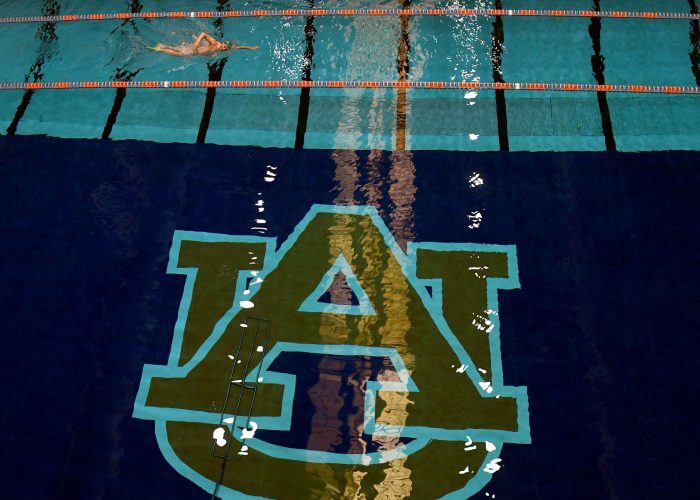
Photo Courtesy: Delly Carr / Swimming Australia Ltd.
Gary Taylor: First and foremost, I think it has to come from the staff. I think if we talked a lot in the first year or I talked to the staff a lot about sharing the vision. What is the program going to look like? What are we going to be in the future? How do we get there? What’s the process? But then I said, we’ve got to hold ourselves accountable. We are sharing the vision on a regular basis with our team. It’s really important and certainly early on that we’re more so the vision. Here’s what the staff is going to do. Here’s what we’re going to be about. Now watch us put that into place and work towards that on a daily basis. So I think early on it becomes very staff driven. But you’ve got to teach the team. Set the standards. Set the expectations high. Help them rise to that, to those outcomes and to those expectations. I think as you recruit your own people and develop your own people within the program then, after a while, I think it’s always kind of coach overseen. You really hope at some point that the athletes themselves are driving the culture. That the team, the culture, the family itself can take people in and mold them into the shape that we’re that we’re looking for. So early on I think it’s driven by the staff. And as time goes on, your hope is that the team evolves and that they’re able to kind of take the reins on that.
Champion’s Mojo: With as difficult a job as coaching a combined program is, what are some routines or rituals, things that you do to make yourself a high performer?
Gary Taylor: I think ultimately the expectations are really important. With our student athletes if you give them an opportunity to feel fatigue, or complain, or go through the motions, I think they’ll take that. I think as a coaching staff, you have to set the tone. We’ve got to work hard. We’ve also got to push our athletes to reach a certain expectation that anything less than that is going to be unacceptable. And I think, you know, look, we’re all human. We all have off days. However, I think if you always listen to your athletes and what they have to tell you. I’m tired, this is tough or that’s tough, they’ll lower that bar. And so I think as a coach it’s on us to push them through those points and teach them that, hey, you had a tough test or you’re going through something in a relationship or things are happening at home or a practice has just been really hard and it’s getting cold outside and it’s tougher. I think you can push a lot of your athletes through those certain points. And when they see outstanding outcomes or great workouts or great performances and meets, then they start to say to themselves, hey, the mind is a powerful thing. So if I can push myself through this and just get my body ready, I’m able to achieve a lot more than I thought I was capable of. I use this statement all the time, but teaching that the impossible is possible opens the doors to a lot of great successes. I think that’s what we have to do on a regular basis. They are human. But if we allow them to rise to their best expectations then they’re capable of doing great things on a weekly basis.
Champion’s Mojo: So all Division I head coaches have pressure to perform. That’s just the nature of it. How do you personally deal with the pressure of having a new program and taking over a program like Auburn in general?
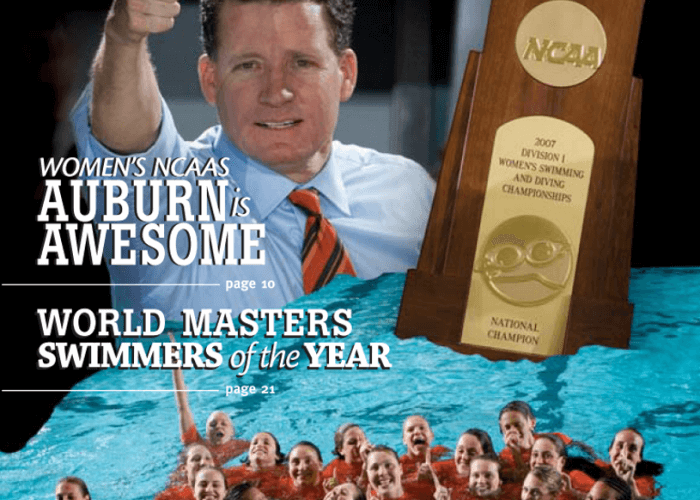
Photo Courtesy: Swimming World Magazine
Gary Taylor: I think for our program, for me, at some point I sat back and I said, I have the awesome opportunity to lead the Auburn program. At the same time I can’t worry about shoes that I have to fill. I’d be lying if I said that the successes and the championship history of the program doesn’t cross my mind. You’ve got Eddie Reese was there in the 70’s. You had John Asmuth, followed by David Marsh and Richard Quick. And then my predecessor, Brett Hawke. Those men won 40 NCAA championships between them. Many at Auburn and many elsewhere as well. I’d be lying if I said that those kinds of things don’t cross my mind. We have awesome alumni and people around the program, friends of the program, that want Auburn to get back to where it rightfully should be. At the same time I can only be the best Gary Taylor I can be. So I have to do what I feel is best for the current program. Getting this group better, the staff, the team, growing our program and brand again. I think that there is an inherent pressure when you take over a program like this. That’s part of what I wanted. I always aspired to be a head coach in the Southeastern Conference. I want to test myself against the very best coaches and programs in the country. I realize the expectations here, but I know my own expectations are very similar to that. So you want to test yourself against the best. I want to put myself in a situation where it’s been proven you can win. I feel like we can win. And I want to go out and test myself on a daily basis. That’s just in my character and who I am. So there’s a lot to live up to. At the same time, I’m not sure I would have it any other way.
Champion’s Mojo: So, in general, what traits do you think champions share?
Gary Taylor: I’ve got a pretty basic motto and that is enthused to learn, eager to work, desire to win, all in for the family, all in for the Auburn family. I think too many times as coaches we look for all the outside the box items. I do think there are outside the box items that help. But I don’t think that there’s any outside the box idea that allows for success. Once you do a lot of outside the box things or you do the same outside the box thing all the time, it becomes inside the box. So I think it’s really the ability to be coachable. As coaches, we have to coach hard and connect with our athletes. The athletes try to do the same thing from their side. The willingness to be vulnerable and accepting of the uncomfortable. Being vulnerable and open to constructive criticism or making changes. The willingness for the student-athlete to to live in the uncomfortable and test their boundaries. And then I think the eagerness to work with that. The desire to win is really just the desire to be the absolute best you can be. Those are very basic ideas. What I’ve found throughout my time as a coach. It’s not doing the outside the box things at this insanely high level. It’s doing the basics day in, day out, as good, if not better, than everybody else around you and around the country and world. For me that’s what allows for championship outcomes. From one person to the next those things can be different. I do think everybody has the ability to be coachable and I think everybody has the ability to give their best effort. Sometimes reaching your 10 out of 10 might look different than someone else. But we can all aspire to be our best self. I think the ones that are the most successful and really get the most out of their bodies and their natural abilities are the ones that excel in those areas. We try to make the sport so individual at times but I have never been a part of a high level program that does it individually. I think the team as a family atmosphere has to be cultivated and developed. When we’re all in for one another and I’m swimming or diving for that person across the deck who means a lot to me. That’s when I excel. It’s not just swimming for your teammates, it’s swimming to your utmost potential with everybody around you supporting and caring about your outcome as well. So those are things that we really try to stress within our program on a daily basis.
Champion’s Mojo: What role do you think mindset plays in success and what do you tell your swimmers to think about in tough swims?
Gary Taylor: It’s really a compilation of everything I’ve discussed. I think that the one thing I’ve taken from the sport is that the more I learn, the less I know. I think the second piece to that is the human side. The mind is just an incredibly powerful tool. So I think, whether you’re a sprinter or endurance swimmer, having swag or confidence that you’re going to be successful is highly important. So I think that’s a factor there and that that’s regardless of the event.
Champion’s Mojo: Can you develop confidence? Can you build swag and confidence or is that innate?
Gary Taylor: I’ve been really fortunate to coach some outstanding athletes. I’d like to think that I played a role or helped in their process. Sometimes the ones that are successful and do the things right are the easiest to coach and work with. I think we’re blessed as coaches to work with outstanding athletes. I think you have the ability, as their coach, to build confidence within them. I think their willingness to be vulnerable and willingness to live in the uncomfortable kind of takes them to that next level. That goes back to teaching them that the impossible is possible. I don’t think it’s all coach and I don’t think it’s all athlete. I’ve seen athletes that they already have that and you can help build upon it. I’ve seen others that don’t know they have it in them, and you’re able to draw that out of them and then they start to gain confidence and belief in who they are and really take off. I think that it’s a combination of the two. At the same time, I think there are some athletes that you can do everything you can and you may not reach them. Confidence works on so many different levels, in all aspects of life. I think that I’ve been very fortunate to coach some talented athletes and I’ve seen them become very successful. I’ve also seen athletes that maybe weren’t born with all the natural talent. Their greatest asset was their mind. The willingness to go above and beyond when other people just couldn’t handle the pain and fatigue. It’s a different mentality for sure. I think that talent’s great, but I’ve also seen mindsets and just a mental toughness overcome talent as well. I think that’s kind of a trait and really kind of a talent as well, the ability to push yourself past the limits that others aren’t willing to go to. And that takes an incredible mindset that can be really, really successful in the endurance races.
Champion’s Mojo: What do you think about race strategy?
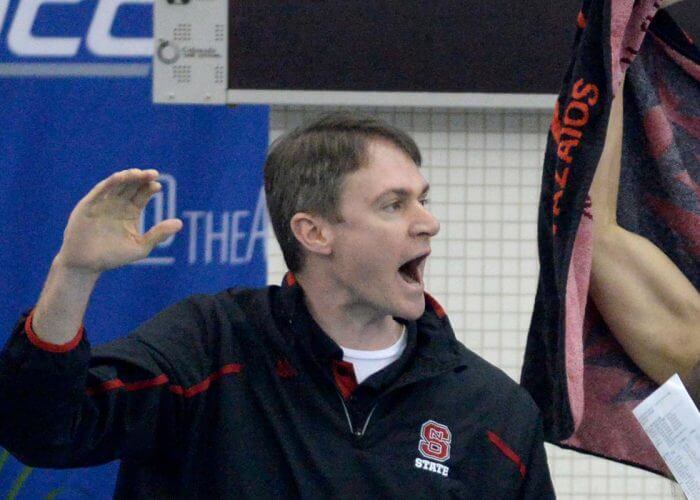
Photo Courtesy: Sarah D. Davis/theACC.com
Gary Taylor: I talk a whole lot with my athletes about race strategy and when to make moves and how to do that. I also think that if you’ve done the work, if you’ve been consistently strong in practice. You’re embracing the ideas. Doing the training that’s asked. I think we work on a daily basis to live in the uncomfortable. So getting your mind to understand what the uncomfortable feels like and learning that you can get through that. A lot of swimmers will say, “ oh, man, I died at the end of the race.” Then you go back and look at splits and you’re like, well, you got tired, but you were within two or three tenths every 50 from start to finish. That’s not dying. That’s just maybe that’s what it’s supposed to feel like when you swim fast. I think it’s being willing to live in that uncomfortable place. I think you get there by training in a certain way each and every day to learn how to deal with that. To learn how to mentally handle that. Learn that, hey, you may be uncomfortable, but you can swim through it or hey, this didn’t feel good but, man, look at the performance. Look at the outcome in terms of time or the way you swim. I think it’s getting individuals to learn that, hey, I go through this every day. So when I’m up there behind the blocks and I’m swimming that back 500, I’ve done this on a regular basis so I know it’s supposed to feel like this and I know how to overcome that and keep my mind focused on the important things like race strategy. I would say the unique piece in endurance swimming, certainly if you’re doing a mile, you can be way out front or way behind and you’re all by yourself. So it really becomes mental. I think that’s a different aspect in endurance swimming that sometimes you don’t see in other races. I think there’s a lot to be said for training that aspect on a daily basis and learning to overcome that. So when you’re out there and you’re competing you’ve done it before. I know how to do this here. The things I need to focus on. And it’s going to be uncomfortable. But if I’m living in the uncomfortable, I could be performing really, really well.
Champion’s Mojo: What are your thoughts on the difference in coaching men and women?
Gary Taylor: I find that, with men, it’s a good time, lots of laughter and humor. Let’s have some fun. Let’s work hard. Let’s run through a wall. I think the majority of men out there will grasp and understand that and they love the camaraderie, the brotherhood of it. I think on the women’s side, it’s very different. I think the relationship between the coach and the athlete is really important. I think both in this way, you can ask them to do hard things and, when they know that there’s a purpose behind it and they know that you care, it’s going to allow them to become successful in the future. I do think women, even more so, really value that relationship with the coach. Getting to know them as people is really important. Knowing that they have value within the group or the program I think goes a long way. I think sometimes women look solely at outcome and performance. Who you are as a student. Who you are on the pool deck. Your work ethic in the pool. It’s not always about the outcome. Who are you as a person and finding values in each and every athlete. I certainly think that there is some crossover, but they are also vastly different. Even with each gender there are a lot of different personalities. So what works for some guys might not work for others. That’s the art of coaching a combined program.
Champion’s Mojo: What do you think the advantages of a combined program are?
Gary Taylor: I think that, if you can get the two to work together, the family’s bigger and the family’s stronger. I think we are great teammates in the pool, I’d like to think we’re a better family outside of it. I think it’s just a bigger support system for both the men and the women. Ultimately I think when you have a combined program and the coaches are on board for both. I think there’s a camaraderie between the two teams. We love and care about each other. I think at times, and this isn’t the same for everybody, when you have two separate programs and two separate staffs, there can be some animosity between them. For me it’s all about coming together and being selfless and all for the family. Developing that family atmosphere and treating each other as brothers and sisters.
Champion’s Mojo: You’ve been around the sport for a long time. What changes have you seen in the sport? What changes have had the most impact in your opinion?
Gary Taylor: I think obviously the athletes of today and even the coaches of today are very different from what we were years ago. We have phones and computers. And I think they’re all positive. Everything is shared. I think coaches are more open about what they’re doing on a regular basis and the idea of sharing workouts or sharing about their programs and their athletes. It’s harder to find things that you just haven’t seen before. That’s also really cool because you can pick other people’s brains and see what’s going on, whether it be what’s going on in Alabama, or California, or over in Europe. I think that’s unique to this generation. I also think that being constantly engaged through computers and phones has changed the culture of the current athlete, how we speak to them and coach them. I think that’s certainly changed the sport. Outside of that the biggest physical change would be all the different types of equipment. We’ve got so many things at our disposal, whether it be outside the water in terms of video or different equipment and ways of doing things in the pool. I think that’s unique to where we are in 2020. I think beyond that, the suits have changed things. The suits that they’re using now to me are very different from what we were using 20, 30, 40 years ago. I think the biggest difference for me has been recovery tools. We talk about tools, the NormaTec, the cold tub, massage therapy. Nutrition. Even hydration. The amount of information that is open to coaches and athletes is just vast. Recovery has become a buzzword, but a very accurate buzz word in that the ability to get back to your 10 out of 10 on a regular basis is going to allow you to train at a higher level more consistently. I think little things in the pool are the starting wedge. There’s been some changes within turns and under waters and whatnot. So there’s a number of things that have made our sport better. More exciting. More opportunities. More outside the box potential from that standpoint. Just the sharing of information is vastly different now than it was maybe even 5 or 10 years ago.
Champion’s Mojo: So on an innovative theme here, what are your thoughts on the International Swim League and pro swimming?
Gary Taylor: Anything to grow our sport. I think any press is good press. I think there are some people that feel like this is not a positive and there’s others that do. I think watching what’s transpired in terms of the energy, the excitement on the pool deck, getting some of the fastest swimmers, not only in our country, but across the world together, competing has been awesome for the sport. The international stage is incredibly important and so is the idea of earning money in the future. I’m all for the idea of our athletes in swimming earning money and getting great exposure.
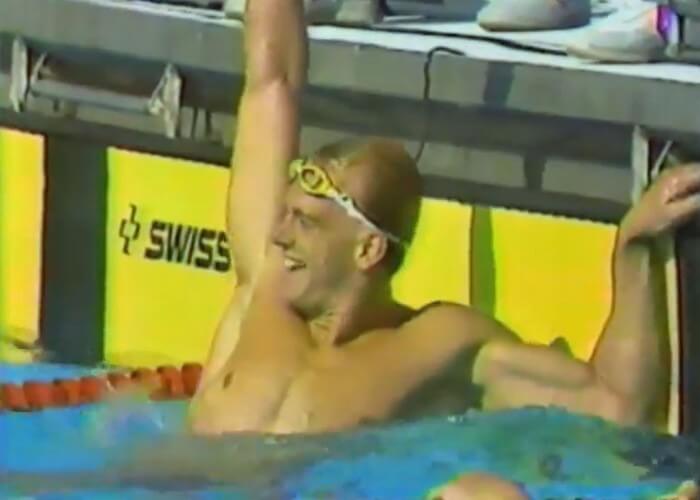 Champion’s Mojo: What a history to have someone as well known as Rowdy Gaines come out of Auburn. He’s probably the most decorated swimmer to come out of the school as well.
Champion’s Mojo: What a history to have someone as well known as Rowdy Gaines come out of Auburn. He’s probably the most decorated swimmer to come out of the school as well.
Gary Taylor: When you think about the swimmers that have come through Auburn and competed and performed at the conference, NCAA, international, and Olympic level, I think our program is right up there with the absolute best in all of collegiate swimming. And obviously Rowdy persevered throughout his time, all those American athletes that were left out of the Olympics in 1980. He comes back in 1984 and wins gold medals. He continues to be one of the biggest supporters of Auburn’s swimming and diving. We’ve been fortunate in Auburn. We’ve had Charles Barkley, Frank Thomas, Bo Jackson, and Cam Newton. And Rowdy Gaines’ name is right up there with those men from an athletic standpoint. Certainly he’s one of our Olympic gold medalists and certainly on a pedestal. We’re very fortunate to have the ability to to have people like this back to our campus. He’s a fan of Auburn’s swimming and diving and is an incredibly passionate fan of just swimming in general. And we’re really blessed, really, really blessed to call him one of our own.
Champion’s Mojo: All right, so the last question is, what have we not covered that you might want to share with our listeners?
Gary Taylor: In terms of my experience, I’m extremely fortunate to be the head coach at Auburn University. I get an opportunity every day to work at the best university in the country. There are so many unique qualities to Auburn and what it offers from a swimming standpoint. Part of the allure for me was just the championship history, the championship mindset. This is where we should be. This is where we want to be. I’ve got my predecessors. When you go through Brett Hawke and David Marsh and John Asmuth and Eddie Reese and Richard Quick. Those are some of the best that any coach could ever follow.To be able to walk deck on a daily basis means a whole lot to me. It’s certainly unique. You walk out and you see the championship banners and trophies and the history every day. It’s pretty awesome to know that you’re really a part of that and you’re part of the Auburn swimming and diving family. That’s where we want to get back to. And the bar has been set really high in terms of Auburn itself. The most unique part of Auburn is Auburn. Nothing speaks to the Auburn family more than a comment I recently received from one of our alumni. He coaches elsewhere and he had mentioned, in our university, we use the so-and-so family and you’re part of our family. He basically looked me dead, straight in the eye and said,I don’t use any of that. He’s like, where we are, what they’re embracing isn’t, necessarily family to me. He said that, unless you’ve been a part of the Auburn family, you have no idea what family means. And that was as powerful a statement as I’ve received since taking the position in Auburn. But it’s very true. People love Auburn. They love the community of the university. It’s all aspects: academics, town, campus, athletics.
Champion’s Mojo: Thank you so much for spending this time with us today!
Gary Taylor: My pleasure, thank you for having me!



